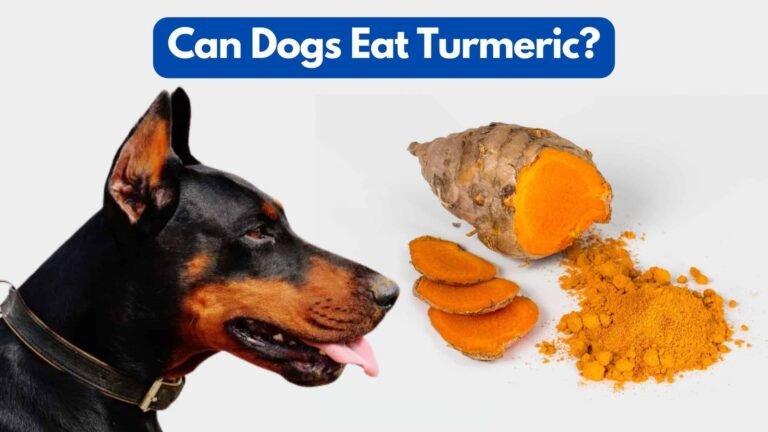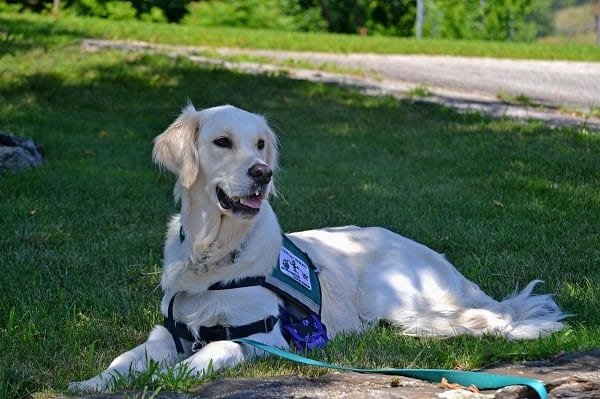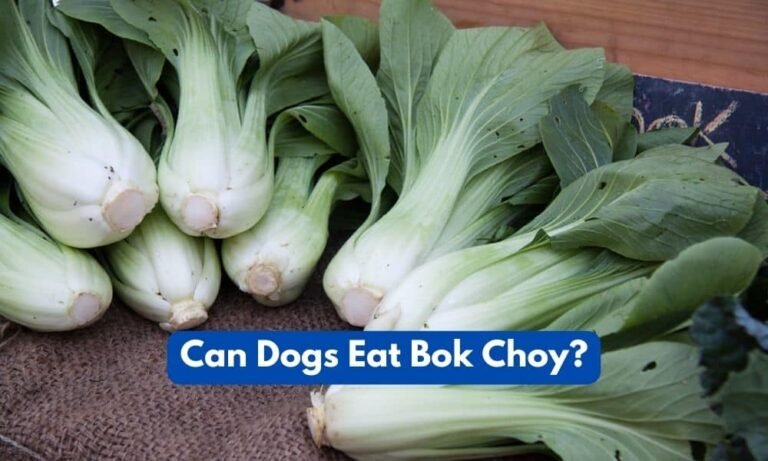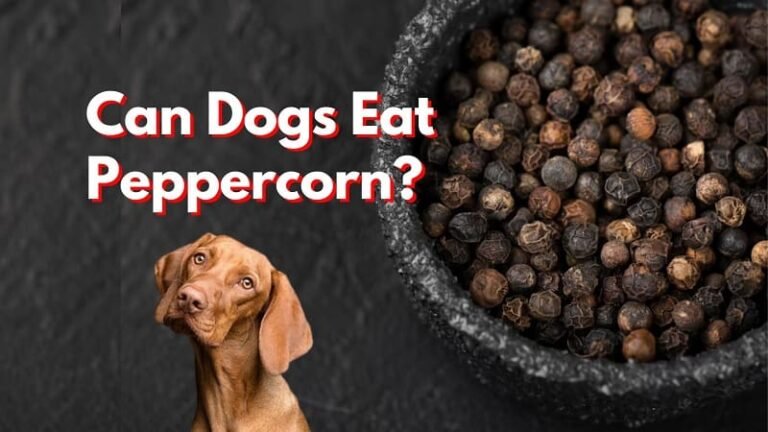Can Dogs Eat Collard Greens?
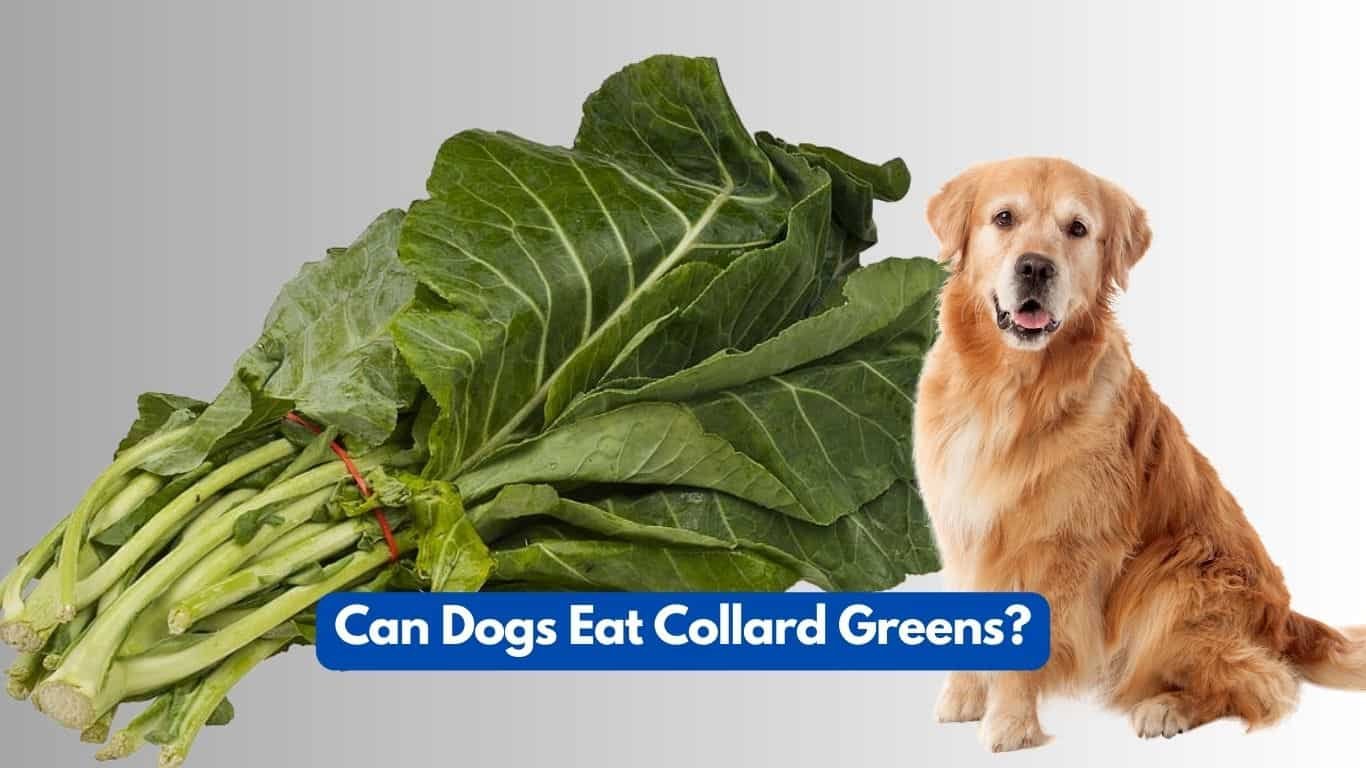
Dogs are curious creatures, and they tend to explore their surroundings with their mouths. As a result, it’s not uncommon for them to sample human food, including vegetables like collard greens. However, as a pet owner, you may have questions like “Can dogs eat collard greens?” or “Are collard greens safe for dogs?” Well, the short answer is yes, dogs can eat collard greens.
Collard greens are rich in vitamins and minerals that can benefit your dog’s health. However, it’s important to prepare them correctly and feed them in moderation. While collard greens are not toxic to dogs, overfeeding can lead to digestive issues such as diarrhea and vomiting.
As a pet owner, you should also be aware that some dogs may have an allergic reaction to collard greens while others won’t. Symptoms of an allergic reaction may include itching, hives, and difficulty breathing. If your dog experiences any of these symptoms after eating collard greens, you should contact your veterinarian immediately.
In this comprehensive guide, we will discuss the safety, benefits, and precautions associated with feeding collard greens to our furry friends. Let’s get started!
Can Dogs Eat Collard Greens?
Yes, dogs can eat collard greens in small quantities especially cooked collard greens. In feeding collard greens to dogs, moderation is key as too much of anything, even a healthy vegetable, can lead to digestive upset in dogs.
I recommend introducing collard greens gradually into your dog’s diet and observing their response. Over time, you can decide to increase the portion of collard greens you add to your dog’s meals.
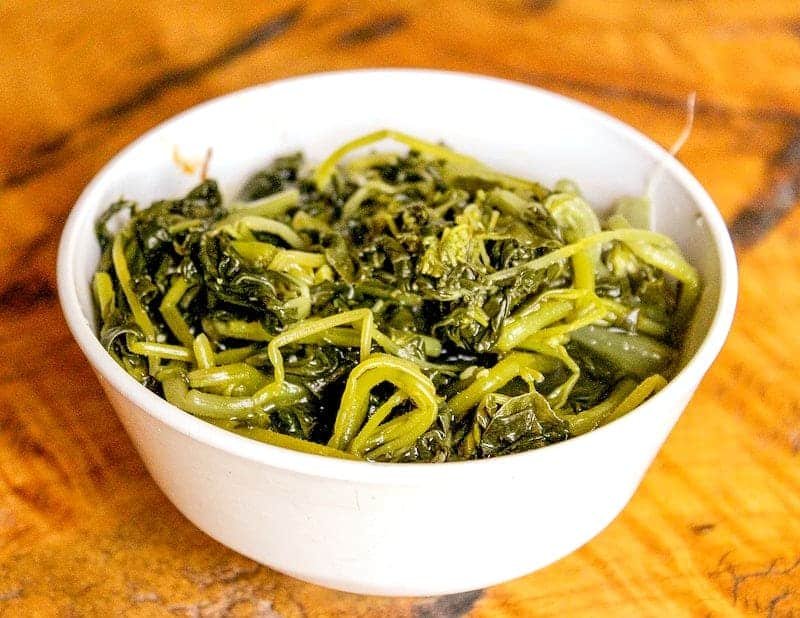
Nutritional Benefits of Collard Greens for Dogs
Collard greens offer several nutritional benefits for dogs. Let’s take a closer look at the key nutrients found in collard greens and how they contribute to your dog’s health.
1. Vitamins and Minerals
Collard greens are packed with vitamins A, C, and K, as well as minerals such as calcium, iron, and potassium. These nutrients play a vital role in supporting your dog’s immune system, bone health, and overall well-being.
2. Fiber
The high fiber content in collard greens promotes healthy digestion in dogs. Fiber adds bulk to the stool, preventing constipation and maintaining regular bowel movements. It can also aid in weight management by providing a feeling of fullness.
3. Antioxidants
Collard greens contain antioxidants, such as beta-carotene and lutein, which help combat oxidative stress and reduce the risk of chronic diseases. These antioxidants contribute to your dog’s cellular health and may have anti-inflammatory properties.
Potential Risks and Precautions
While collard greens can be a nutritious addition to your dog’s diet, there are some potential risks and precautions to keep in mind.
1. Oxalates
Collard greens, like other leafy greens, contain oxalates. Oxalates are naturally occurring substances that can form crystals and contribute to the development of kidney stones in susceptible individuals, including dogs. If your dog has a history of calcium oxalate stones, it is best to consult with your veterinarian before introducing collard greens into their diet.
2. Allergies or Sensitivities
Just like humans, dogs can have allergies or sensitivities to certain foods. While collard greens are not known to be highly allergenic, it is important to observe your dog for any signs of adverse reactions after consuming collard greens. These may include itching, gastrointestinal upset, or respiratory issues. If you notice any concerning symptoms, discontinue feeding collard greens and consult your veterinarian.
3. Existing Health Conditions or Medications
If your dog has any underlying health conditions or is taking medications, it is crucial to consult your veterinarian before adding collard greens to their diet. Certain health conditions, such as hypothyroidism, may require dietary restrictions, and collard greens could interfere with medication absorption.
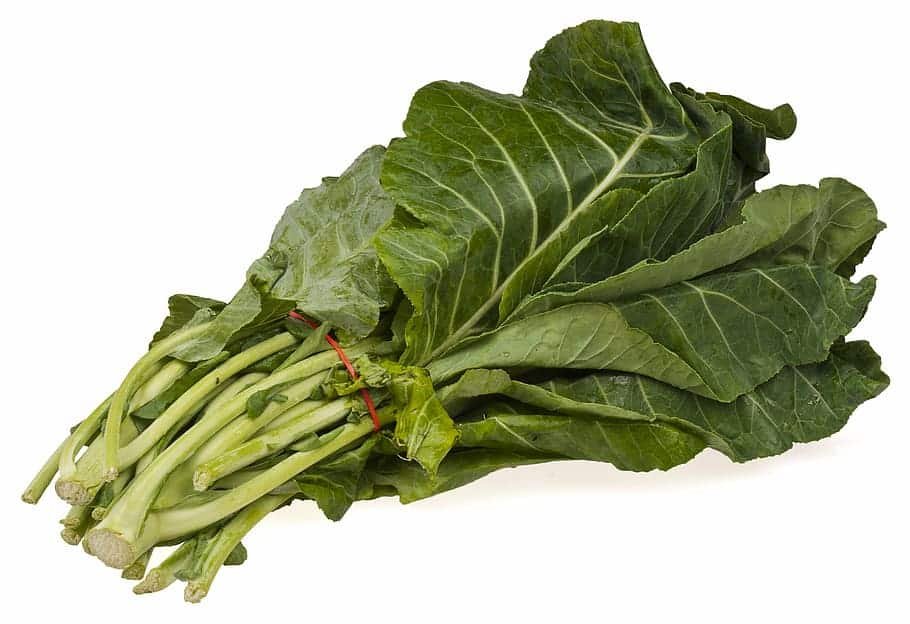
Can Dogs Eat Raw Collard Greens?
Raw collard greens may be difficult for dogs to digest and can cause gas or bloating, hence, it is not safe for dogs to eat raw collard greens.
Also, raw collard greens contain a compound called oxalates, which, in large amounts, can interfere with calcium absorption and potentially lead to kidney issues in dogs.
It is advisable to cook collard greens before offering them to your furry friend. Cooking collard greens not only makes them easier for dogs to digest but also helps break down the oxalates, reducing any potential risks associated with their consumption.
Can Dogs Eat Collard Green Stems?
Collard green stems are safe for dogs to eat, as long as you cook the stems thoroughly before offering your dogs to eat. Just like the leaves, the stems contain essential nutrients and fiber that can contribute to your dog’s overall well-being.
To prepare collard green stems for your dog, remove any tough parts and chop them into small, manageable pieces. Cook the stems, just like the leaves, until they are soft and easily chewable. Remember to let them cool down before offering them to your furry friend to avoid any risk of burns.
Can Dogs Eat Collard Green Leaves?
Yes, dogs can eat collard green leaves, but again, you must cook the leaves before serving your dogs. Raw collard green leaves can be difficult for dogs to digest and may cause digestive upset. However, when cooked properly, collard green leaves can be a healthy addition to your dog’s diet.
Recall that cooking collard green leaves not only enhances their digestibility but also helps break down any potentially harmful compounds, such as oxalates. Steaming or boiling the leaves until they are tender is a suitable cooking method. Be sure to let the leaves cool down before offering them to your dog, and avoid adding any seasonings or spices that may be harmful to dogs.
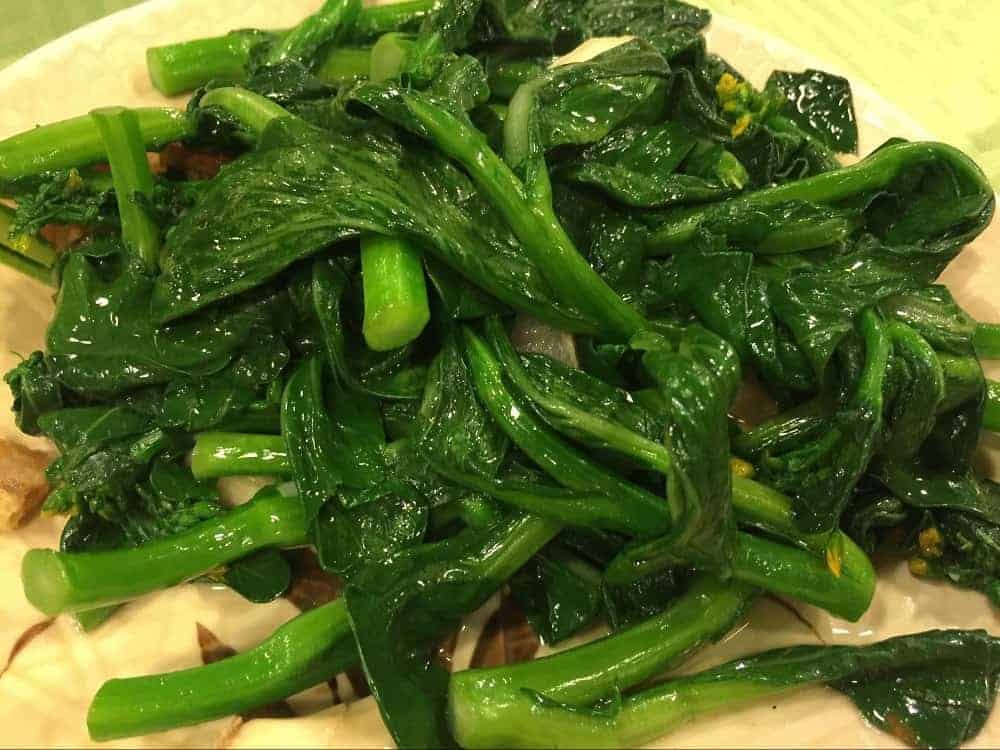
Can Dogs Eat Collard Green Flowers?
Collard green flowers, also known as broccoli rabe or broccoli raab, are safe for dogs to eat in moderation. These small yellow flowers possess a slightly bitter taste and are packed with vitamins and minerals. However, it’s important to note that not all dogs may enjoy the taste of collard green flowers.
When offering collard green flowers to your dog, make sure they are cooked to enhance their digestibility. Steaming or boiling the flowers until they are tender is the recommended cooking method. Always serve them in moderation and observe your dog’s reaction to ensure they tolerate them well.
Can Dogs Eat Collard Greens When They Turn Yellow?
Collard greens are at their peak when they have vibrant green leaves. However, as the leaves mature, they may turn yellow. The good news is that dogs can still consume collard greens when they turn yellow, as long as they are cooked thoroughly.
Yellowing leaves indicate that the collard greens have reached their maturity and may have a slightly stronger flavor. Nonetheless, the nutritional value remains intact. Simply remove any tough or damaged parts, cook the collard greens until they are soft and easily chewable, and allow them to cool before serving them to your dog.
Can Dogs Eat Cooked Collard Greens?
Yes, dogs can safely eat cooked collard greens as part of a balanced diet. Cooking collard greens makes it easier for dogs to digest and absorb the nutrients. Also, it helps break down potentially harmful compounds such as oxalates, which can interfere with calcium absorption.
To prepare cooked collard greens for your dog, start by washing the leaves thoroughly to remove any dirt or pesticides. Remove any tough stems and chop the leaves into small, manageable pieces. Steam or boil the collard greens until they are tender, and let them cool down before serving them to your furry friend.
Can Dogs Eat Canned Collard Greens?
Canned collard greens are often cooked and seasoned with added ingredients, such as salt and spices. While a small amount of plain, unsalted canned collard greens may not be harmful to dogs, it’s generally best to avoid feeding them this version of the vegetable. The added seasonings and preservatives in canned collard greens can be detrimental to your dog’s health.
If you’re considering adding collard greens to your dog’s diet, it’s recommended to opt for fresh or frozen collard greens. These options allow you to control the cooking process and ensure that no harmful ingredients are included.
How to Feed Collard Greens Dogs
When introducing collard greens to your dog’s diet, consider the following recommendations:
- Start with small portions: Begin by offering a small amount of cooked collard greens and observe your dog’s response. Gradually increase the portion size over time if there are no adverse reactions.
- Mix with regular food: Incorporate collard greens into your dog’s regular meals by mixing them with their usual food. This can add variety and provide additional nutrients.
- Treat alternative: Chop cooked collard greens into small, bite-sized pieces and use them as a healthy treat alternative. However, remember to account for the additional calories from collard greens in your dog’s overall daily calorie intake.
- Vet-approved recipes: Consult with your veterinarian for recipes or recommendations on incorporating collard greens into your dog’s homemade meals. They can provide guidance based on your dog’s specific dietary needs.
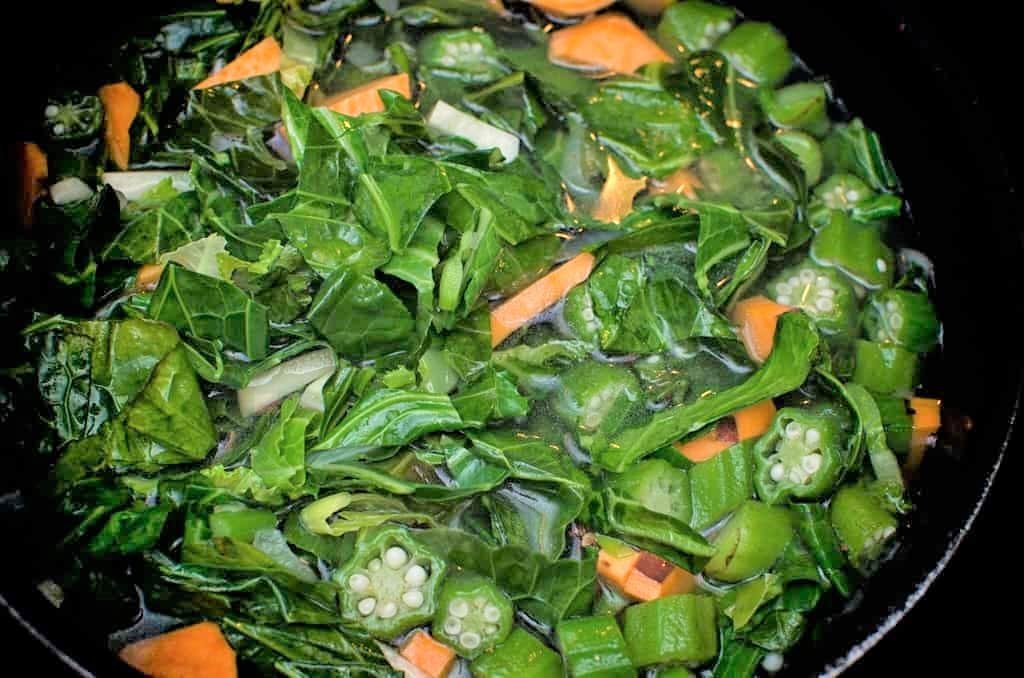
Alternatives to Collard Greens for Dogs
Here are some alternative vegetables that you can consider feeding to dogs instead of collard greens:
1. Spinach: Spinach is a nutrient-rich leafy green vegetable that can be given to dogs in small amounts. It provides vitamins A, C, and K, as well as iron and fiber.
2. Kale: Kale is another leafy green vegetable that is safe for dogs when given in moderation. It is packed with antioxidants, vitamins A and C, and calcium.
3. Broccoli: Broccoli is a cruciferous vegetable that dogs can enjoy. It contains vitamins C and K, as well as fiber. Make sure to remove any tough stems and only offer small florets.
4. Green beans: Green beans are a low-calorie vegetable that dogs can eat as a treat or mix into their meals. They are a good source of fiber and vitamins C and K.
5. Carrots: Carrots are crunchy and nutritious vegetables that dogs love. They are rich in beta-carotene, vitamin A, and fiber. Raw or cooked carrot slices can make a healthy snack for your furry friend.
6. Zucchini: Zucchini is a summer squash that can be given to dogs. It is low in calories and contains vitamins A and C, as well as potassium and fiber. Cooked or grated zucchini can be added to your dog’s food.
Frequently Asked Questions Related to “Can Dogs Eat Collard Greens?
Can dogs safely eat collard greens?
Yes, dogs can safely eat collard greens in moderation.
Are collard greens toxic to dogs?
No, collard greens are not toxic to dogs. They are generally safe when given in small amounts.
Are collard greens a good source of nutrients for dogs?
Yes, collard greens are rich in nutrients like vitamins K, A, and C, making them a healthy addition to your dog’s diet.
Can collard greens be harmful to dogs if fed excessively?
Yes, feeding collard greens excessively can lead to digestive upset in dogs due to their high fiber content.
How should collard greens be prepared for dogs?
Collard greens should be thoroughly washed and cooked without any seasonings or additives before feeding them to dogs.
Can puppies eat collard greens?
Puppies can eat collard greens, but it’s essential to introduce them gradually and in small quantities to avoid stomach issues.
What are the benefits of feeding collard greens to dogs?
Collard greens offer various benefits, including promoting better digestion, supporting immune health, and providing essential vitamins and minerals.
Conclusion
In conclusion, dogs can eat collard greens in moderation as part of a balanced diet. Collard greens offer several nutritional benefits, including vitamins, minerals, fiber, and antioxidants. However, it is crucial to prepare collard greens properly, feed them in moderation, and be aware of any potential risks or allergies your dog may have.
As always, consult with your veterinarian before making any significant changes to your dog’s diet. By following these guidelines, you can ensure the well-being and health of your beloved canine companion.
Other Dog Food Resources
- Can Dogs Eat Cinnamon Rolls? A Comprehensive Guide for Pet Owners
- Can Dogs Eat Turmeric? Surprising Benefits of Turmeric For Dogs
- Can Dogs Eat Food With Cinnamon? A Comprehensive Guide for Pet Owners
- Can Dogs Eat Rawhide Chews? Is Rawhide Chews Bad For Dogs?
- Can Dogs Eat Mulberries? 6 Awesome Benefits
- Can Dogs Eat Olives? The Ultimate Guide
References:
- Masterclass – Can Dogs Eat Collard Greens? Benefits and Considerations
- Dog Time – Can Dogs Eat Collard Greens? Are Collard Greens Safe
- Spoiled Hounds – Can Dogs Eat Collard Greens? What to Know About Dogs And Collards
